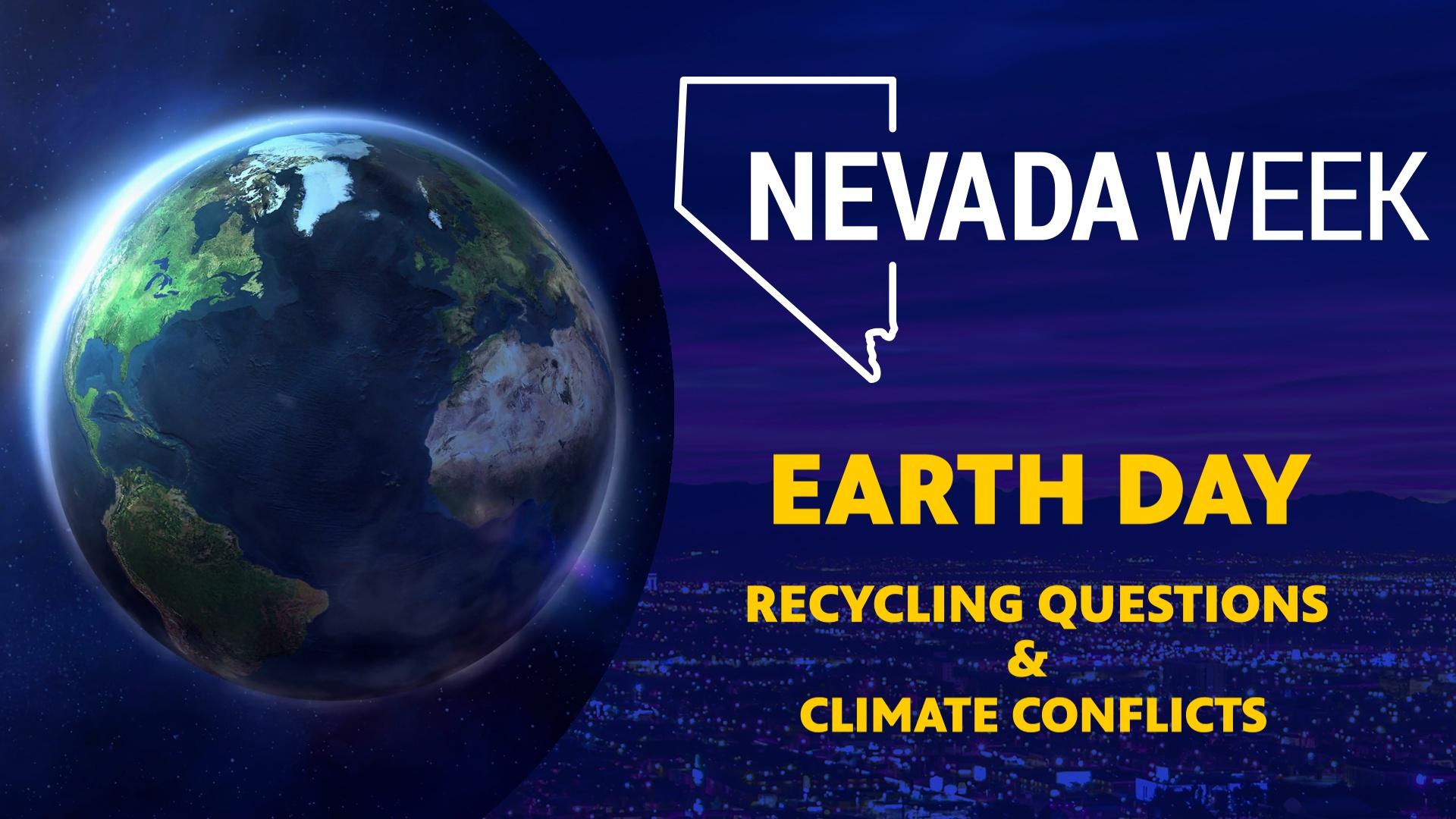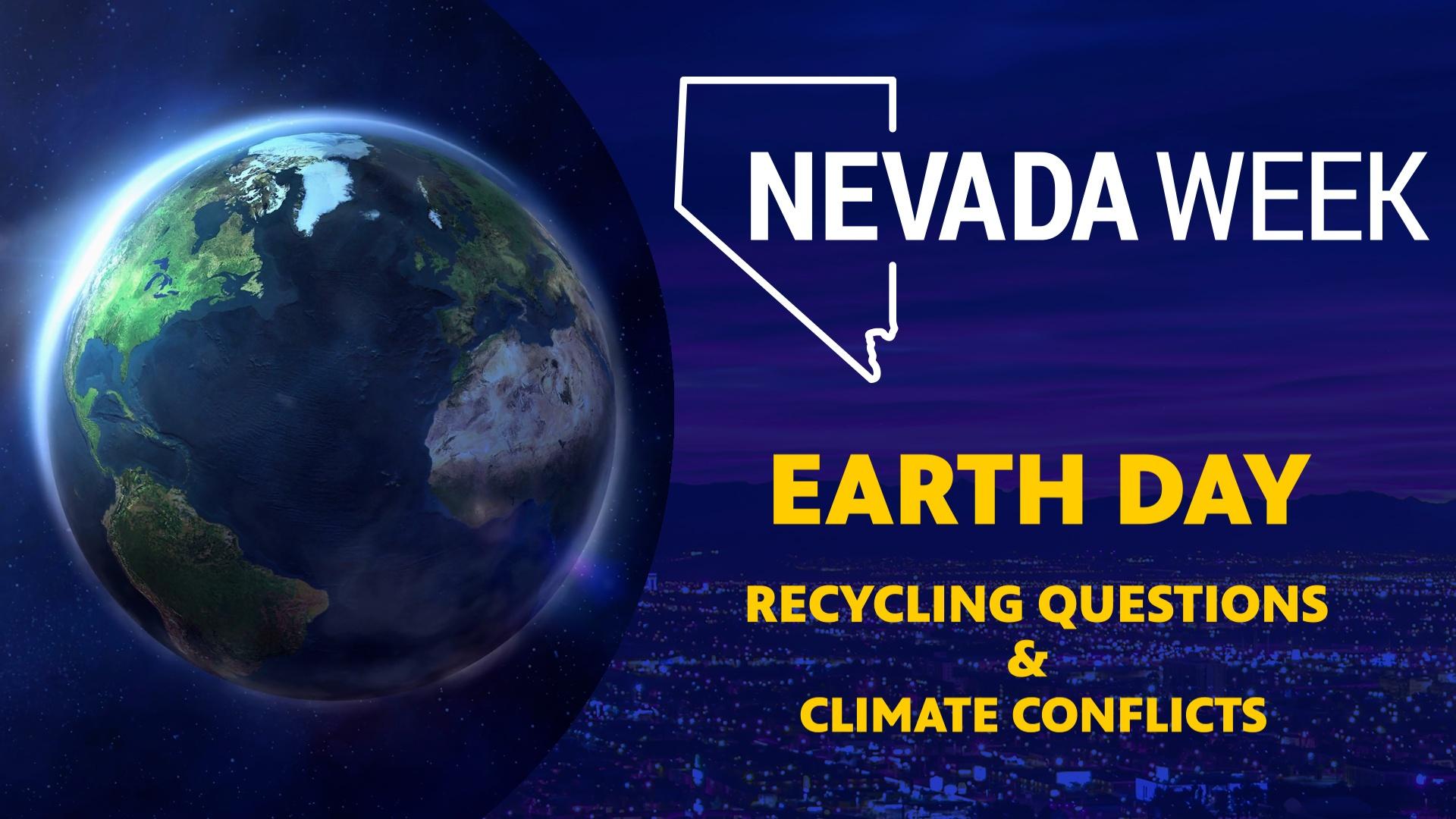Earth Day: Recycling Questions and Climate Conflicts | Nevada Week


Your recycling questions answered and the conflicts in addressing climate change.

SEASON 4: EPISODE 41 | Airdate: 4/22/2022
Recycling is one way everyone can play a part in creating a more sustainable world but there are a lot of questions about what can and cannot be recycled.
Clark County recycles about 23 percent of its waste last year, which is the same as the year before. Compare that with Douglas County, which recycled more than 49 percent of its waste, and Washoe County which recycled 29 percent of its waste.
Republic Services, which operates the recycling facilities in Clark County, attributes some of the county’s low numbers to a lack of understanding about what can and can’t be recycled.
Things that can be recycled are glass bottles and jars; plastic bottles and jugs; metal cans; cardboard boxes and paper, including junk mail. Before you drop those items in the recycling bin, Republic Services asks that you clean out any food or liquid that might be in the cans or bottles and let them dry a little.
Jeremy Walters with Republic Services said there is a fine line between asking too much of people and not doing enough to prepare recyclables. If you ask too much, people won’t actually recycle. But if they do nothing, there is a risk of contaminating cardboard and paper recyclables with food and liquid.
Walters also said you don’t have to remove the labels off of soup cans and plastic bottles and you also don’t have to remove tape or paper labels off of cardboard boxes.
Things that can’t be recycled are items that are mixed materials, meaning they’re comprised of more than one kind of material. An example is a milk carton, which is paper that is coated in a waxy substance. Walter said that even if there is a recyclable label on packaging it doesn’t always mean it can be recycled.
Republic Services takes rigid plastics that are labeled with a 1, 2 or 5 in the recycling symbol.
You also can’t recycle plastic grocery bags or other flexible plastics. The bags can get jammed up in the sorting equipment. Walters's advice is to skip them altogether and instead use reusable bags at the grocery store.
One of the biggest misconceptions, according to Walters, is that Republic Services sorts garbage so there is no reason for you to do it at home. He said that is not the case. He said people are provided a trash bin and a recycling bin for a reason.
If you live in an apartment complex or a condominium and you don’t have a recycling bin, Walters suggests talking to the homeowners association about setting up a recycling program or gathering your recyclables and bringing them to one of Republic Services drop off sites or a drop off site at UNLV/
Republic Services Recycling Drop Off Locations
560 Cape Horn Dr. , Henderson
333 W. Gowan Rd, North Las Vegas
UNLV Drive up and Drop off: Southeast corner of Flamingo Rd. and Swenson
CLIMATE CONFLICTS
Federal and state leaders are stressing the importance of addressing climate change as its impact of it is being felt everywhere; however, solutions are sometimes creating problems of their own. Nevada is home to a number of these conflicts.
One is in Dixie Valley near Fallon. The area is home to a rare toad that can only be found there but that is where a company wants to create a geothermal power plant. Geothermal power uses heat from within the earth to power turbines to produce power.
Daniel Rothberg is the environment reporter for the Nevada Independent. He said that geothermal power is an important power source because it is clean energy, meaning it doesn’t burn fossil fuels, and it runs 24 hours a day, seven days a week, and can fill in some of the gaps from when solar and wind energy isn’t available.
However, geothermal power requires groundwater pumping and tapping into aquifers. The concern in Dixie Valley is that the project will interfere with the toad’s habitat. The area is also an important site for the Fallon Paiute-Shoshone Tribe, which relies on the meadow for religious and cultural practices.
The Fish and Wildlife Service extended emergency protection for the toad noting that protecting small populations like the toad ensures the continued biodiversity necessary to maintain climate-resilient landscapes.
Rothberg said Nevada is one of the most biodiverse states in the country. He said Nevada may not be home to some of the large species that grab attention, but it is home to unique and rare species that are being threatened by climate change and encroachment on their habitats by human activity.
While some people may wonder why preserving a small toad is important, Rothberg pointed out that biodiversity is valuable and preserving it is vital.
“There are all sorts of ways that animal species regulate our environment and our habitat to help clean water, air. A lot of our medicines, a lot of our discoveries come from the diversity of biological species,” he said.
Another area where climate and environmental efforts are colliding is lithium mining. Lithium is an important ingredient in making electric vehicle batteries and large-scale storage batteries, which are both needed to decarbonize the grid.
Nevada is home to large lithium deposits but the mineral needs to be mined and mining causes damage to the environment. The issue is at the center of a debate in Thacker Pass, north of Winnemucca. There are concerns that a large lithium mine there could disrupt wildlife corridors and water supplies. There are also concerns by indigenous people who consider the area to be sacred.
Another conflict is Tiehm’s buckwheat in the Silver Peak Range in Esmeralda County. The buckwheat only lives on a patch of land that is also home to a large deposit of lithium. Conservationists say relocating the buckwheat or getting it to grow someplace else may be very difficult because it has evolved to grow on a spot rich in lithium. But the company that wants to build a lithium mine on the site believes it could produce enough lithium to make batteries for 400,000 cars.
Right now, the United States imports most of its lithium to make batteries but both the Trump administration and the Biden administration have pushed to increase lithium mining in the U.S. to increase energy independence.
Rothberg said as the U.S. transitions into renewable energy and away from fossil fuels, many people are asking policymakers to make sure that transition is being done in a thoughtful way that takes into account equity and fairness.
